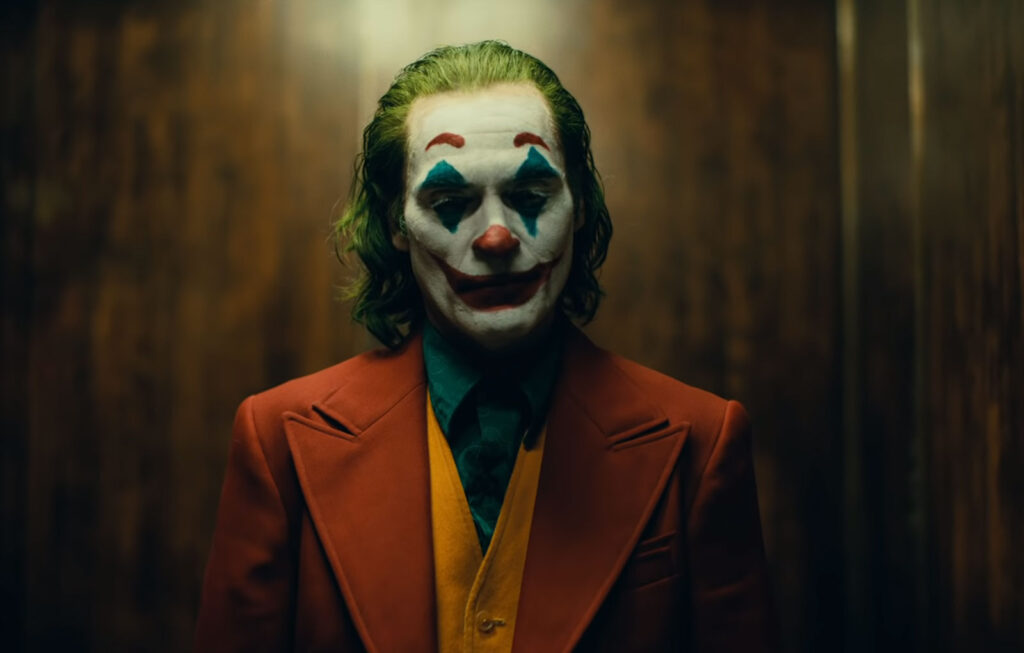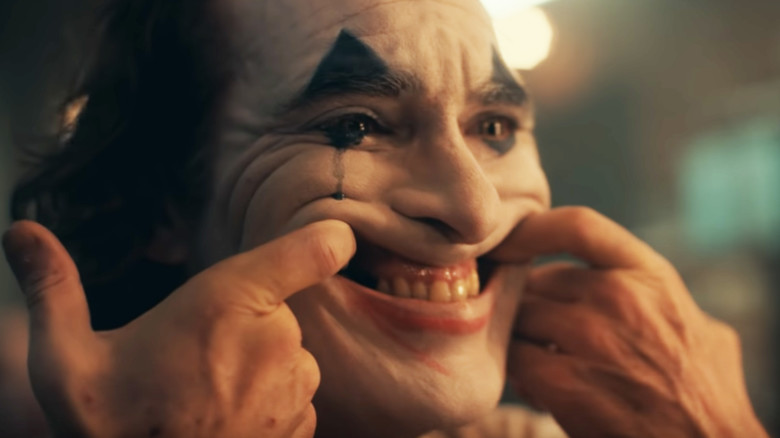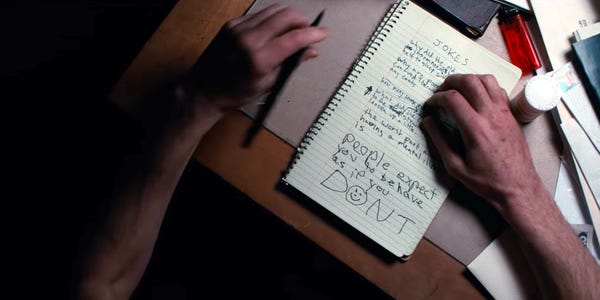
By Victoria Sananikone, Editor
Photos found by the courtesy of Google
*Contains no spoilers*
The most impactful movies are the ones that make you feel some type of way, that prompt you to think, that leave you unable to collect your thoughts until a few hours later. Todd Phillips has delivered to us a film that does just that. Dark, gritty, and filled to the brim with the essentials of a masterpiece, Joker is a film that will go down in cinematic history along with the riveting performance by Joaquin Phoenix whose skills are up to par with that of Heath Ledger’s Oscar-winning Joker.
If I had to describe Joker in one word, it would be “unsettling.” Joaquin Phoenix portrays a mentally ill Arthur Fleck in a manner that sends a chill down your spine. With his hollow eyes, greasy hair and protruding bones from his skinny frame, Fleck’s appearance is enough to signal a man who isn’t right in the head. Within the opening scene I had chills that continued to scatter across my skin throughout the whole movie. There are moments where your blood will curdle and moments that are so grotesque you can’t help but become mesmerized.
Three qualities that succeed in unsettling the audience would be Fleck’s infamous smile, his disturbing laugh, and the spectacular score.
There never seems to be a moment where Fleck isn’t flashing a menacing grin, typically at the most inappropriate times. The smile stretches from ear to ear as he squints his eyes causing the skin on his weathered face to fold and crease like a paper bag. It’s worse when he hooks his fingers under his top lip, pulling up to contort his face into a forced look of happiness. Fleck is not a happy man, in fact, all he has are negative thoughts, he tells his social worker during his therapy sessions. When he was little, his mother told him that he was put on earth to spread joy and laughter, so by forcing a smile on his face, Fleck is attempting to make his mother’s statement a reality.

The disturbing laugh is something that Phoenix had to study before executing in the film. We learn that Fleck has a neurological condition where he is subjected to uncontrollable fits of laughter when overcome with emotion, a condition that is similar to Tourette’s Syndrome. Phoenix really hit the nail on the head with this one, producing unnerving, high pitched laughs that seem to cause him pain as his character claws at his neck in an attempt to suppress it. But it is impossible for him to control it, which gives off a devilish impression to those around him. His laugh is absolutely humorless at the beginning of the movie when we see that it is simply his condition wracking his body. However, as the movie progresses and he begins to evolve into the Joker, he seems to have control over his laughter that no longer come in the form of frightful episodes, but malicious giggles that are produced during the cruelest moments.
Let’s talk about the score of Joker. Bravo, Hildur Guðnadóttir, bravo. The Icelandic composer stole the limelight from the production with her score that was the cherry on top of this thriller. Each song is more ominous than the next, a frenzy of low thrums, tortured groans, and disheartening tones accompanied by powerful orchestral moments. The music personifies Arthur Fleck’s existence with the main theme starring a lone cello whose dark hum casts a shadow over your emotions. Joker is a tragedy, and within Guðnadóttir’s score you can feel the hopelessness, the anger, the resentment, and the hatred that Fleck has for his life and for the world.
As I watched Phoenix’s performance, I couldn’t help but compare his skills to Ledger’s (we’re not even going to mention Jared Leto because PUHlease). Now Phoenix’s role is solely about Arthur Fleck as the protagonist and his descent into the maniac that is the Joker, while The Dark Knight features Ledger’s version of Joker who is already the full-fledged villain. There isn’t as much to compare between the two, but I’m going to go off of a full movie dedicated to the Joker and parts within the Dark Knight in which the Joker is featured. Ledger’s performance was absolutely phenomenal and worthy of the Oscar that he won. Heck, the man locked himself in a room for weeks, experimenting with different laughs and attempting to end up in the realm of a psychopath, in order to perfect the role. When watching The Dark Knight, Ledger plays the Joker in a way that is so psychotic that you feel like he is coming to kill you. The makeup, the swagger, and the terrifying smile scars on his face are nightmare material. Phoenix does not fall short of Ledger’s outstanding performance and extreme dedication. The dude lost 52 freaking pounds to play Arthur Fleck. Phoenix’s Joker was scary, but it wasn’t until the last half of the movie where we actually begin to fear him. In the beginning he just seems like the creepy guy on the subway that you want to avoid making eye contact with, but when he stops taking his medication, his self-control decreases, and it becomes easier and easier for him to kill people. You truly get to know Arthur Fleck as he transforms from a meek outcast into an idol for the oppressed. Similar to Ledger, you cannot tear your eyes away from the screen. You’re scared sh*tless, yet you can’t take your eyes off of the same villain who is so hypnotically evil it’s thrilling.
There is a heavy debate on the meaning of Joker. From my perspective, I believe that Phillips concocted a film about one of the greatest villains of all time while exemplifying the ways in which we treat people who suffer from mental illness in society today. There is a scene in the movie where Arthur is writing in his joke book and we see that he has written “The worst part about having a mental illness is people expect you to behave as if you DON’T,” and he replaces the “O” with a smiley face.

Talk about a savage sub-tweet. This movie is commenting directly on the fact that we don’t do enough to help those who suffer from mental illness. Clear connections to this concept are made when Arthur’s social worker tells him that she can no longer see him due to the government cutting their funds, promptly followed by Arthur telling her that she never listens to him. We see that many people dislike and distrust Arthur due to his unusual behavior and inability to act the way a “normal” person would. The film suggests that we condemn those with mental impairments because the way they act does not fit our standards.
“What do you get when you cross a mentally ill loner with a society that abandons him and treats him like trash?”
There is also heavy debate on the connection between mental illness and violence. Some are intent on pursuing the theory that this is what the film is about, that mentally ill humans are prone to wreak havoc if they are provoked, that they are too unstable to be trusted. But Arthur Fleck’s violent slews only arise form certain triggers where he achieves revenge for being treated like trash. He has absolutely nothing to lose, and enjoys juggling the prospect of suicide, so he lashes out without an ounce of fear.
Some believe that Joker should be banned from theaters because it glorifies gun violence and might prompt a mass shooting. The threat of a mass shooting is certainly valid considering what happened in Aurora, Colorado, at the premier of The Dark Knight in 2012. What I don’t agree with is the idea that Joker glamorizes gun violence, a belief from people who seem to be taking the meaning of the movie to a level more serious than it really is. Did you expect the movie about one of the most notorious villains to not cross boundaries? I completely understand the worry, but Joker is meant to make you uncomfortable. You’re meant to understand the character easier by feeling even the slightest bit of what he feels on a daily basis. When asked about the same idea in an interview by Vanity Fair, Phoenix had an insightful answer.
“We’re making a movie about a fictional character in a fictional world, ultimately, and your hope is that people take it for what it is,” Phoenix said. “You can’t blame movies for a world that is so f–ked up that anything can trigger it. That’s kind of what the movie is about. It’s not a call to action. If anything it’s a call to self-reflection to society.”
-Very thought provoking. It really entices me to go and see it!
Victoria, I have no intention of seeing this movie, but your review was very interesting, thought-provoking, and well written. Great job!
Great article! Professional film critics are having a hard time writing coherently about this movie, and you’ve done so very well!